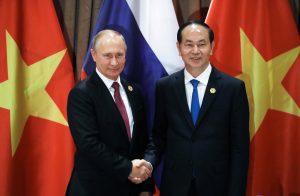Russian President Vladimir Putin is set to visit Vietnam next week, according to Russian media reports and Vietnamese sources, confirming earlier reports that he was set to embark on his first visit to the country since 2017.
Russia’s Vedomosti newspaper reported on Monday that Putin’s visit, which will take place alongside a trip to North Korea, is being “actively prepared,” according to Russia’s Ambassador to North Korea Alexander Matsegora. The report stated that Putin will be in Vietnam on June 19-20.
Citing a Vietnamese official, Reuters confirmed that Putin’s visit was planned for June 19-20, though the trip has not yet been officially announced by either side. The official told Reuters that the agenda “was still under discussion,” but that “energy, military cooperation, settlement of payments, and an agreement in the education field are among the main issues expected to be discussed.”
A visit by the Russian leader was first mooted in late March, when Nguyen Phu Trong, the general secretary of the Communist Party of Vietnam, took a call with Putin. During the call, Vietnamese state media reported, “General Secretary Trong took the occasion to extend an invitation to President Putin to visit Viet Nam in the near future, which the latter accepted with pleasure.” Putin reportedly agreed that “both sides would coordinate to arrange a suitable time for the trip.”
The June 19-20 visit was also confirmed by a Vietnamese source, who stated that Hanoi had at one stage “been hesitant” to approve the visit, given its proximity to Putin’s North Korea visit. Vietnam “doesn’t want to be seen as part of the ‘axis’ which includes Russia, China, Iran, and North Korea,” the source noted.
Nonetheless, Vietnam has seemingly put aside its concerns and prepared to roll out the red carpet for the Russian leader. The source stated that the two sides will discuss banking cooperation, promoting trade through bilateral ruble-to-dong payments, and the possible export of Vietnamese textile and garment products to Russia.
Putin has visited Vietnam four times, most recently for the APEC Summit in Danang in 2017, but the international atmosphere has grown much chillier since Russia’s invasion of Ukraine in February 2022.
For Russia, the visit will likely serve to demonstrate that the United States, European Union, and their partners have failed to isolate Russia since the invasion. Vietnam, meanwhile, continues to pursue good relations with all major powers, Western opprobrium notwithstanding – something that is doubly true of an historically close partner like Russia.
In an article for Fulcrum published in March, Ian Storey wrote that Russian invasion of Ukraine put Vietnam in a tricky position, “elevat[ing] tensions between Hanoi’s old partner Russia and its new partners in the West.” Rather than choosing a side, however, Vietnam has “adopted an essentially neutral position so as to insulate itself from major power disputes arising from the war, preserve stable relations with all the main players and stakeholders, and defend its national interests.”
Indeed, it is likely for the same reason that Vietnam has declined to attend this week’s Global Peace Summit on Ukraine in Switzerland – most likely because Russia has not been invited.
All of this highlights the fact that Hanoi continues to view productive relations with Russia as an important buttress of its national interest. While Putin has become a byword for cruel realpolitik and imperial megalomania in the West, his visit to Vietnam should be viewed in the context of the past two years, during which five of Vietnam’s seven “comprehensive strategic” partners have sent high-level leaders to the country. These include recent visits by both U.S. President Joe Biden and China’s leader Xi Jinping.
Indeed, as I noted last month, the only two “comprehensive strategic” leaders that the country has not hosted in that time are Putin and Indian Prime Minister Narendra Modi, who met with Prime Minister Pham Minh Chinh on the sidelines of the G-7 meeting in Hiroshima, Japan, in May of last year. All this suggests that Putin was bound for the country sooner or later, regardless of the dark light in which he is viewed in Western capitals.
































